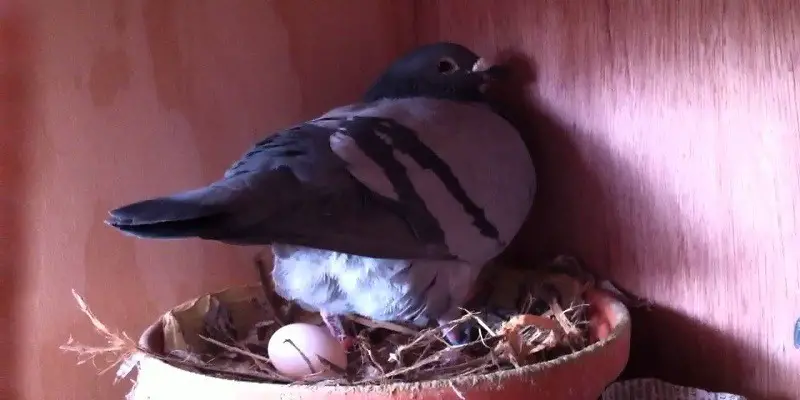If you have pigeons living on your property, it’s likely that at some point they will lay eggs. While it may be tempting to let the birds raise their young, there are several reasons why you shouldn’t allow pigeons to nest on your property. Pigeons can carry diseases that are harmful to humans, and their droppings can contaminate food and water sources.
Additionally, pigeon nests can attract other pests like rats and snakes. If you find a pigeon nest on your property, the best course of action is to remove it and take steps to deter the birds from returning.
Egg Laying Process in Pigeons
If you have pigeons nesting on your property, you may be wondering what to do about the eggs they are laying. Here are some things to keep in mind: The eggs will not hatch if they are removed from the nest.
Pigeons will simply lay more eggs to replace them. It is actually illegal to remove eggs or nests from wild birds in many jurisdictions. Check with your local wildlife authorities before taking any action.
Pigeon droppings can carry disease, so it’s important to minimize contact with them. Use gloves or a dust mask when cleaning up any messes left by the birds. If you don’t want pigeons nesting on your property, there are a few things you can do to deter them: install bird spikes or netting around potential roosting areas; make sure there is no food available for them (clean up spilled seed, etc); and eliminate potential nesting sites by filling in holes or removing ledges where they might build a nest.
What to Do If Pigeons Lay Eggs on Your Balcony
If you find pigeons nesting on your balcony, there are a few things you can do to discourage them from returning. First, try to remove the nest and any eggs that may be present. This can be done by gently shaking the nest from the ledge or using a long pole to reach it.
If the nest is attached to the building, you may need to call a professional for assistance. Once the nest is gone, take steps to prevent pigeons from returning by making your balcony less inviting. Keep doors and windows closed so they can’t enter, and block off any gaps where they might be able to squeeze through.
You can also install bird spikes or netting around ledges to deter them from landing. Finally, don’t forget to clean up any spilled food or water that might attract pigeons in the first place!

Credit: birdsjournal.com
How Long Do Pigeons Sit on Eggs?
Pigeons typically sit on their eggs for 18 days, give or take a few days. The female will do the majority of the sitting, though the male will take over for short periods of time so she can eat and drink. Once the chicks hatch, they are able to fly within a few weeks.
Do Pigeons Leave Their Eggs Unattended?
Pigeons are interesting creatures and their nesting habits are no exception. Pigeons will often build their nests in high places, such as on ledges or in trees. The female will lay two eggs which hatch after 18 days.
Once the chicks have hatched, the parents take turns sitting on the nest to keep them warm and to protect them from predators. Interestingly, pigeons will sometimes leave their eggs unattended for short periods of time. While it may seem like they are not taking proper care of their offspring, there is actually a method to this madness.
By leaving the eggs alone for brief periods, the parents can stretch their legs and get some exercise. Additionally, this gives the chicks a chance to move around and strengthen their muscles before they fledge (take flight). So while it may appear that pigeons are neglectful parents, they are actually just giving their young ones a helping hand!
Do Pigeons Abandon Their Eggs If You Touch Them?
No, pigeons do not abandon their eggs if you touch them. Pigeons are very protective of their eggs and will only abandon them if they feel that they are in danger.
Is It Good If Pigeons Nest at Home?
Pigeons are interesting creatures and many people enjoy having them around. While pigeons can be fun to watch, it is important to remember that they can also pose a serious health risk to humans. Pigeons carry a number of diseases that can be transmitted to humans, including histoplasmosis, cryptococcosis, and psittacosis.
In addition, their droppings can contaminate food and water sources and cause slip-and-fall accidents. If you find that pigeons have nested on your property, it is best to take action right away. There are a number of ways to get rid of pigeons, but the most effective method is to hire a professional pest control company.
These companies will use humane methods to remove the birds and prevent them from returning in the future.
Conclusion
If you find pigeons nesting on your property, don’t panic! While it may be unsightly, there are a few things you can do to get rid of them. First, try to remove the eggs.
This will usually discourage the pigeons from returning. If that doesn’t work, you can try installing a special type of netting over the area where they’re nesting. You should also clean up any food or water sources that might be attracting them to your property in the first place.
Last Updated on January 14, 2025 by Pauline G. Carter

